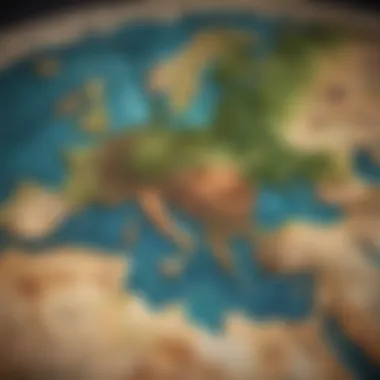Ray Dalio's Insights on Global Power Dynamics


Intro
In a world that continually evolves, where nations rise and collapse like tides, Ray Dalio presents a framework to comprehend these transformations. His observations don’t just scratch the surface; they dig deep into the soil of history and economics, revealing patterns that often escape our notice. As we navigate through the complexities of global power dynamics, Dalio's insights serve as a guiding light, illuminating the shadows where many might tread blindly.
By grounding his arguments in historical precedent and rich analysis, he bridges the gap between the past and present. This context feels crucial, especially when one considers the fluctuating balance of power seen throughout various epochs—where rivalries can shape empires but also ignite their demise. Dalio not only critiques the current geopolitical landscape but lays bare the cycles of dominance and decline, making it essential for students, professionals, and anyone curious about international affairs to engage with his work.
Ultimately, this examination of Dalio's theories encourages a deeper understanding of these perpetual cycles, which shape our societies and the trajectory of our nations. His perspective is not just a scholarly pursuit; it's a call to prepare ourselves for whatever the future may behold.
Prolusion to Great Powers
The concept of great powers plays a pivotal role in understanding the intricacies of global politics and economics. These nations, often marked by their military strength, economic prowess, and cultural influence, wield considerable sway on the world stage. At the heart of this topic lies the exploration of their rise and potential decline, a theme that resonates powerfully in Ray Dalio's analysis. It sheds light not only on historical trajectories but also on current dynamics that affect international relations.
Understanding great powers is critical for several reasons. Firstly, great powers significantly shape global policies and practices. Decisions made in capitals such as Washington, Beijing, or Moscow can lead to far-reaching consequences, affecting everything from trade agreements to military alliances. Secondly, the study of great powers provides insights into the patterns that govern their ascension and fall, offering valuable lessons for future leaders and scholars alike.
Moreover, examining great powers enables a deep dive into the socio-economic factors influencing their trajectories. By distinguishing characteristics of these powers, one can appreciate the delicate balance of leadership, public sentiment, and government stability.
Defining Great Powers
Defining what constitutes a great power is more intricate than it appears at first glance. Traditionally, great powers are identified by several key characteristics:
- Military Capability: A great power typically possesses a formidable military force, enabling it to project influence or intervene in international conflicts.
- Economic Power: Economic strength sustains a great power's global influence, providing the resources necessary for military funding, diplomacy, and trade initiatives.
- Political Influence: Great powers often have the ability to shape international policies and norms, either through direct diplomacy or by setting examples that others follow.
- Cultural Impact: The soft power of a nation, derived from its cultural exports, education systems, and global brands, further enhances its status as a great power.
This multifaceted definition reveals that being a great power requires a robust combination of attributes. It isn't merely about size or wealth; it’s about the capacity to influence and lead in a rapidly changing world.
Historical Context
To grasp the current landscape of great powers, one must delve into the historical context that shaped nations over the millennia. The rise and fall of powers—whether ancient kingdoms like Greece and Rome or more contemporary entities like the British Empire—provide critical insights into the factors that dictate status on the world stage.
In ancient times, power was often rooted in military conquests and territorial expansion. As we moved into the 20th century, the world witnessed the emergence of more complex global interactions, including colonialism and the establishment of international organizations. Events such as World Wars, the Cold War, and economic crises have also played substantial roles in shifting power dynamics.
Through these historical shifts, one can observe recurring themes and patterns. The economic boom in the post-World War II era propelled the United States into a dominant position, while the rise of emerging markets like China in the 21st century signals a significant power shift, echoing previous transitions in history.
Thus, understanding the historical context surrounding great powers is essential for comprehending contemporary global politics. Dalio's insights compel us to consider how history often repeats itself and how these patterns can inform our predictions about the future of global leadership.
Ray Dalio's Perspective
Ray Dalio, a prominent figure in the investment world, offers a compelling examination of how great powers rise and fall through a combination of historical analysis and contemporary observation. His perspective is rooted in the belief that understanding the patterns of history can provide valuable insights for future leaders and policymakers. This section delves into his main arguments and emphasizes the importance of learning from past experiences.
Overview of Dalio's Arguments
Dalio outlines a cyclical nature of empires that can be distilled into various factors influencing their ascent and decline. He emphasizes three core elements:
- Economic Strength: Economic health underpins a nation's capacity to influence and assert power on the global stage. Dalio highlights that the prosperity of nations often correlates with their ability to innovate and adapt amidst changing times.
- Political Stability: He argues that effective governance, characterized by clear leadership and sound policies, significantly contributes to a nation's resilience. Countries with dynamic leadership often navigate crises more adeptly than those entrenched in bureaucratic inertia.
- Social Cohesion: The social fabric of a nation plays a critical role. Dalio posits that societal discord can undermine political stability and economic performance. Thus, building a sense of shared identity and purpose among citizens is crucial.
Dalio’s arguments resonate deeply, particularly in a world grappling with rapid changes brought on by globalization, technological advancements, and shifting geopolitical alliances. By drawing connections between past phenomena and present challenges, he encourages leaders to adopt a holistic view when strategizing for the future.
The Relevance of History in Dalio's View
In examining history, Dalio underscores the relevance of historical events and patterns as tutor for contemporary decision-making. He often references past great powers, focusing on their rise and subsequent decline, to illustrate the cyclical nature of history.
"Those who cannot remember the past are condemned to repeat it."
—George Santayana
Dalio argues that nations often fall into the trap of ignoring history. He advocates for a comprehensive analysis of previous eras, as this can illuminate the factors that led to both successes and failures. For example, studying the collapse of the Roman Empire reveals insights into governance, economic mismanagement, and societal division that still resonate in today's world.
Some key historical considerations Dalio brings to light include:
- The Role of External Threats: Countries often face challenges from rival powers. History shows that prolonged conflicts can drain resources and destabilize leadership.
- Adaptation to Change: Great powers that resisted change, be it economic, technological, or social, faced dire consequences. The British Empire failed to adjust to the post-World War II realities, leading to its twilight.
- Crisis as Catalyst: Pandemics, economic downturns, and social movements can trigger significant transitions—a reality mirrored in the historical narratives Dalio presents.
In summary, Dalio's perspective emphasizes the importance of historical awareness in shaping modern strategies. By learning from the contrasts and continuities of past great powers, current leaders can navigate this increasingly complex global landscape more effectively.


The Cycle of Rise and Fall
Understanding the cycle of rise and fall is crucial to grasping not only Ray Dalio's insights, but also the broader realities of global power dynamics. This cycle has been a recurring theme throughout history, manifesting through myriad nations, each with their own unique trajectories. The importance of recognizing these cycles lies in their predictive power; discerning patterns allows leaders and scholars to anticipate potential challenges and opportunities.
Each rise often comes alongside economic booms, marked by innovation, strong governance, and societal cohesion. Likewise, declines typically emerge from a mixture of internal decay and external pressures, revealing vulnerabilities that can lead to a downward spiral. Thus, analyzing these cycles grants invaluable lessons in strategy and foresight, particularly for today's emerging powers and established nations alike.
Economic Cycles
When discussing economic cycles, it is essential to consider how they drive the trajectories of nations. Essentially, an economy experiences phases of expansion and contraction, akin to the ebb and flow of tides. For example, in the early 20th century, the United States rode a wave of economic prosperity, characterized by rapid industrial growth and innovation. This rise supported the nation’s emergence as a global power.
However, the cycle turned, and the Great Depression underscored the fragility of economies caught in cycles of excess. This downturn didn’t just impact the U.S.; it sent shockwaves across the globe, affecting Europe and beyond. The lesson is clear: economic health is often cyclical and can significantly influence a country's position in the international arena.
"All great powers rise and fall, often in sync with their economic fortunes, for no other force is as disruptive as an economy in turmoil."
Outside direct economic output, additional elements—like income inequality—further exacerbate or mitigate the repercussions of these cycles. Countries with glaring economic disparities may face social unrest during downturns, complicating their recovery and trajectory.
Thus, Dalio's perspective emphasizes the need for nations to maintain balanced and sustainable economic practices to withstand the inevitable downturns and emerge stronger.
Political and Social Factors
On the political front, cycles of power reflect shifts in governance styles, leadership quality, and popular support. History teaches us that the strength of leadership directly correlates with national vitality. Countries that see strong, visionary leaders, like Franklin D. Roosevelt during the New Deal era, often shine through crises, steering their populace toward recovery.
Conversely, political dysfunction can lead to a downward spiral. In the era of the late Roman Empire, political infighting contributed to its downfall, as leaders prioritized personal gain over collective stability. A fragmented political landscape, filled with corruption and divisiveness, weakens the societal fabric, creating a ripe ground for further decline.
Similarly, social factors cannot be overlooked. Nations that cultivate a sense of cohesion and shared identity often find greater resilience in tough times. Social unity fosters collaboration, leading to innovative solutions to address economic and political woes. For instance, countries in Northern Europe often demonstrate that social welfare systems can correlate with political stability and economic growth, showcasing a successful model where citizen engagement enhances governance.
In summary, the cycles of rise and fall encapsulate a complex interplay of economic and political elements, with social dynamics serving as a stabilizing or destabilizing force. Recognizing these factors can empower nations to navigate the tumultuous waters of global power shifts, ultimately forging a more sustainable path forward.
Analyzing Past Great Powers
Understanding the historical narrative of great powers is pivotal for grasping the present and predicting the future of global dynamics. Analyzing Past Great Powers not only sheds light on the strategic missteps and victories that shaped nations but also highlights key patterns that repeat over time. In light of Ray Dalio's findings, this section aims to dissect the paths taken by past powers like Greece, Rome, the British Empire, and the United States. As we explore these historical figures, we will discover enduring lessons about economic shifts, military conflicts, and cultural influences that continue to resonate in today's geopolitical landscape.
Greece and Rome
The rise and fall of Greece and Rome is a timeless saga that echoes through history books and continues to be relevant. Greece, the cradle of Western civilization, laid the groundwork for democratic governance, philosophy, and the arts. Its fall, however, was marked by internal strife and external invasions. The city-states, renowned for their intellectual pursuits, became fragmented, paving the way for Rome's ascendance.
Rome's story twists and turns through military conquests and political intrigue. From a republic to a sprawling empire, Rome exemplifies how military might can fuel a nation's rise. However, decay often lurked within. Corruption, economic disparity, and social unrest chipped away at its foundation, reminding us that even the most formidable powers can crumble from within. As Dalio emphasizes, the lessons from these ancient civilizations resonate strongly today; the roots of greatness can easily sow the seeds of decline.
The British Empire
The British Empire, often termed as the empire on which the sun never set, serves as a classic example of ambition and overreach. At its peak, Britain expanded across continents, propelled by industrialization and naval dominance. It harnessed technology and innovation like no other, which fueled unprecedented economic growth. The empire was a large web of political influence, trade routes, and cultural exchanges.
Yet, as the saying goes, pride comes before a fall. The very expansion that marked Britain's zenith also sowed discontent among colonies. Nationalism surged, and movements for independence began to take root, leading to a gradual disintegration of power. The loss of its colonies post-World War II marked a crucial turning point. Dalio's analysis underscores the idea that sustainability in power necessitates adaptability and conscious governance. The decline of the British Empire serves as a window into understanding how imperial grandeur can slip through one’s fingers.
The United States
The United States paints a modern picture of power dynamics. Emerging from the shadows of European conflicts, it quickly established itself as a global leader through both military prowess and economic innovation. The post-World War II era positioned the U.S. as a superpower, with significant influence in international politics and economics. Its soft power, projected through culture and diplomacy, has often been unmatched.
However, in the last few decades, the U.S. has faced mounting challenges. Political polarization, social unrest, and economic inequalities hint at vulnerabilities. The rise of other global players, particularly China, adds another layer to this narrative. As Dalio posits, the question remains: Can the U.S. adapt to a multipolar world? The patterns that dictated the trajectories of past powers could very well be at play in shaping the future of American influence.
Emerging Powers in Today's World
The landscape of global power is continually shifting, and today, new players are emerging on the stage, capturing attention and reshaping dynamics. This topic is crucial not just for enthusiasts of history, but also for anyone invested in understanding economic trends, international relations, and societal frameworks. Ray Dalio’s observations provide insightful perspectives on how these emerging powers, notably China and India, are poised to influence the world.
China's Ascendancy
China's rise as a global powerhouse is a phenomenon that has commanded attention for years. Its rapid economic growth, backed by industrial strength and technological innovation, is a clear demonstration of how determined efforts can propel a nation within a few decades. The nation's journey from a primarily agrarian economy to the world's manufacturing hub illustrates a significant transformation.
A major consideration in China's ascent is its Belt and Road Initiative. This ambitious strategy aims to enhance global trade by creating a modern Silk Road, extending its influences across Asia, Europe, and Africa. This isn't just about economic benefits; it's about establishing a geopolitical foothold. In this context, China isn’t merely trading goods; it’s forging pathways that could redefine relationships between nations.
China's technological advancements are another pillar of its rise. Companies like Huawei and Alibaba have not only dominated the market but also challenged Western counterparts. As technology becomes the backbone of economic strength, China's investment in AI, renewable energy, and biotechnology signals a willingness to not only catch up but to perhaps lead.


However, it is essential to contemplate the caveats that accompany such growth. Domestic issues—such as income inequality, environmental challenges, and political dissent—could pose risks to its stability. Moreover, how the U.S. and other Western nations adapt to this new reality will be a crucial factor in determining the dynamics of global power.
"China is not just a rising power; it is altering the very rules of the game."
India's Growth Trajectory
In contrast, India presents a different but equally compelling narrative of potential growth. With a young and rapidly expanding population, coupled with increasing digital penetration, India's landscape is rich with possibilities. The Make in India initiative, launched to encourage multinational companies to manufacture their products in India, exemplifies the ambitions to boost self-reliance and attract foreign investment.
The tech sector in India is an impressive force driving its economy. Home to giants like Infosys and Wipro, India's IT industry not only contributes significantly to its GDP but also positions the nation as a formidable player in the global tech arena. The rise of startups, fostered by a young demographic and lower operational costs, signals India's readiness to innovate and lead.
Yet, challenges remain. Issues such as infrastructural deficits, bureaucratic red tape, and disparities in education and health care are potential stumbling blocks. How India manages these challenges while harnessing its diverse resources will be pivotal in determining whether it can fulfill its potential on the world stage.
Impact of Technology on Power Dynamics
In today’s world, technology shapes the contours of power more acutely than ever before. The impact of technology on power dynamics is not just a passing theme—it is a decisive element that influences how nations strategize, govern, and engage with both the global community and their own citizens. From military innovations to advancements in communication, the importance of this topic in discussing Ray Dalio's perspective on great powers is multifaceted and far-reaching.
One key element of technology’s impact is how it creates new avenues for economic growth while simultaneously heightening competition among global powers. Nations that harness technological advancements can leapfrog traditional economic paradigms, leading to significant shifts in global influence.
Moreover, as technology evolves, it fundamentally alters the nature and pace of warfare. The reliance on tech in defense strategies has brought about a new age of military capabilities. Countries that invest in cutting-edge technologies often find themselves at a distinct advantage on the international stage, allowing them to exert influence or counterbalance opposing powers effectively.
Technological Advancements and Their Consequences
Technological innovations are the bedrock upon which modern economies are constructed. The proliferation of the internet, artificial intelligence, and robotics has ushered in a new era that engenders both opportunities and challenges. In Ray Dalio’s analysis, the consequences of these advancements extend well beyond economics—it also influences social stability and governance.
- Economic Growth: Nations that effectively leverage advancements in technology often witness accelerated economic growth. As businesses adopt intelligent systems, efficiency increases and production capacities rise. This correlates heavily with a nation's ability to compete in the global market.
- Inequality and Social Strain: While tech can lead to economic boons, adopting new technologies can also exacerbate existing inequalities. Those who lack the necessary education and skills may find themselves left behind, leading to societal friction. Dalio points to this divide as a pivotal factor in the declining cohesion between different societal segments.
- Environmental Considerations: With technological growth comes a responsibility toward sustainable practices. If developing nations disregard environmental considerations in their chase for advancement, it could lead to catastrophic consequences.
Technological advancements present both tools of empowerment and potential pitfalls. Nations must navigate these waters astutely to avoid pitfalls that could underpin their own successes.
Cybersecurity and Information Warfare
As technology evolves, so does the landscape of threats that nations face. Cybersecurity has emerged as an unprecedented necessity in safeguarding a nation’s infrastructure, economy, and ultimately, its sovereignty. Dalio emphasizes that a nation’s vulnerability to cyber threats can significantly undermine its power.
However, cybersecurity isn’t just about defense; it's also an offensive tool. Information warfare, characterized by the strategic use of information (or misinformation) to influence public opinion or destabilize rivals, has changed the very fabric of geopolitical engagements.
- Infrastructural Vulnerability: Modern infrastructures, from financial systems to energy grids, are heavily reliant on technology and increasingly susceptible to cyber-attacks. A successful cyber intrusion can jeopardize a nation's stability considerably.
- Manipulation of Information: Nations can utilize social media and other technology platforms to manipulate narratives and influence elections. Information can be weaponized, blurring the lines between truth and falsehood, thus destabilizing societies from within.
- Active Cyber Defenses: Countries must prioritize building robust cybersecurity frameworks to protect against espionage and attacks. Investment in cyber capabilities is no longer an option but a necessity for maintaining power.
In summary, the evolution of technology serves as both a facilitator for growth and a backdrop for significant challenges. As Ray Dalio asserts, understanding these dynamics is key for future leaders, as they navigate the treacherous waters of global power relations.
"The pace of technological change will increasingly determine the balance of power amongst nations." - Ray Dalio
Countries that can adapt to the shifting landscape may find themselves positioned as leaders, while those slow to respond risk relegation to the sidelines of history.
Social Cohesion and Stability
In understanding the dynamics of world powers, social cohesion and stability emerge as critical elements. These factors are essential, not just for the longevity of a power, but also for its ability to adapt, innovate, and respond to external challenges. A society with high levels of cohesion is often marked by a shared identity, common values, and trust among its members. This makes it fitter for tackling both internal unrest and external threats, resulting in a more resilient nation.
The Role of National Identity
National identity plays a vital part in the fabric of society. When citizens perceive a strong sense of belonging to their nation, they are more likely to show loyalty and support for state initiatives. This identity is often shaped by historical narratives, cultural symbols, and collective memories. For instance, countries like Japan illustrate how a robust national identity can contribute to social harmony, enabling them to mobilize efforts for economic growth and political stability.
Moreover, national identity can enhance social resilience. A society that celebrates its unique cultures while embracing inclusivity can better withstand shocks such as economic downturns or political strife. When individuals feel connected to their nation, they are more likely to cooperate in times of hardship. This connection fosters social capital, which is essential for collective problem-solving.
"A nation that stands united, driven by a shared purpose, can weather any storm."
To create and maintain a strong national identity, leaders must promote policies that foster inclusiveness while respecting diversity. Education systems that encourage understanding of different perspectives are crucial for building this cohesive identity.
Civil Society and Governance
Equally important to social cohesion is the role of civil society in governance. A vibrant civil society acts as a channel through which citizens can engage with one another and with their government. It encompasses a range of organizations, from nonprofit groups to grassroots movements, each contributing to the social fabric by advocating for different issues and offering a platform for public discourse.
For instance, in Scandinavian countries, civil society is instrumental in promoting welfare policies that drive social equality. These nations enjoy high levels of trust between government and citizens, which results in cooperative efforts for societal betterment. This trust facilitates effective governance, enabling rapid and informed responses to issues that require immediate attention.


In contrast, in regions where civil society is weak, governance often suffers. A lack of public engagement can lead to decisions being made without considering the broader social implications, resulting in policies that may not reflect the needs or values of the population. This discord can unravel the very fabric binding a nation together.
Thus, fostering a strong civil society is as essential as ensuring effective governance. Leaders must recognize the importance of engaging citizens not just as voters but as active participants in the democratic process. Encouraging dialogue and creating channels for civic engagement can help build a stable, cohesive society that is better positioned to adapt to the challenges of an evolving global landscape.
Economic Disparities
Economic disparities stand as a pivotal theme in understanding global power dynamics. As Ray Dalio illustrates throughout his work, the stark divisions between the rich and the poor within nations—and even between countries—undoubtedly shape the landscape of influence and authority. Disparities in wealth can lead to social unrest, erode societal cohesion, and ultimately threaten the stability of nations. They can be seen as a double-edged sword: while on one side, they may serve as a motivator for individual ambition, they can also exacerbate tensions that lead to the decline of great powers.
Income Inequality and Its Effects
Income inequality is not merely a statistic but a profound societal issue that affects the very fabric of nations. When a small portion of a population wields considerable wealth, while large swathes struggle to make ends meet, the repercussions can be severe.
- Social Fracture: With the gap widening, resentment builds among those left behind. This disenfranchisement fosters an environment ripe for civil strife, protests, and, in extreme cases, revolts. In countries such as Egypt, economic disparities preceded monumental social upheaval during the Arab Spring.
- Political Consequences: Economically disadvantaged individuals often feel alienated from formal political systems. When people's voices are not heard, it leads to disillusionment and apathy, further entrenching the political status quo and stifling progress.
- Economic Stagnation: A society rich in inequality may also experience stunted economic growth. When wealth is concentrated, consumption—driven mostly by middle and lower-income groups—dips. The economy relies heavily on a robust consumer base that is unable to thrive when income is rarefied. This has been noted in several post-industrial nations where growth stagnated amid rising inequality.
"The greatest danger for a society isn’t that it’s unequal, but that it allows that inequality to fester and fracture its social cohesion,” comments Dalio as he reflects on historical precedence.
Global Trade Dynamics
Global trade dynamics offer another lens through which to understand economic disparities. The complexities of international commerce frequently exacerbate existing inequalities, both within and among states.
- Trade Agreements: While free trade is often championed as a means of fostering growth, the reality can be a mixed bag. Countries that can negotiate better terms often find themselves reaping the benefits, while developing nations are frequently left to grapple with unfavorable agreements that reinforce their economic vulnerabilities.
- Supply Chain Dependencies: Advanced economies often benefit from file-driven supply chains that allow them to capitalize on lower labor costs abroad. This can perpetuate cycles of disadvantage, as wealth and power consolidate in countries with existing advantages, leaving others further behind.
- Technological Disparity: In a globalized environment, technological prowess significantly influences trade outcomes. Wealthy states are able to invest in technological advancements, giving them a competitive edge that developing nations struggle to match. This is reflected in the digital divide now becoming a new battleground of inequality.
In summary, understanding economic disparities, from income inequality to the complexities of global trade, sheds light on the underlying structures that shape great powers. The paths nations take can often be traced back to these disparities, making it a crucial study for future leaders seeking to navigate and influence the global landscape.
Lessons for Future Leaders
Understanding the rise and fall of great powers is not merely an academic exercise; it has real-world implications that resonate deeply with future leaders. In Ray Dalio's perspective, the historical patterns of power dynamics carry lessons that can steer decision-making processes and governance strategies. These lessons underscore the importance of flexibility and insight, equipping emerging leaders with the necessary tools to navigate an unpredictable global landscape.
Strategic Decision-Making
Strategic decision-making lies at the heart of effective leadership. Dalio emphasizes that decisions should not be made in a vacuum; they must be informed by the past and grounded in a realistic assessment of current circumstances. Leaders must learn to recognize the signs of change and act swiftly. Historically, many great powers failed because their leaders were blindsided by shifts in political or economic landscapes. This implies that, to avoid repeating history, future leaders should:
- Foster an Analytical Mindset: Analysis of trends—whether economic, political, or social—can reveal insights into potential future outcomes. Leaders should engage their teams in rigorous analysis, encouraging critical thinking and questioning of assumptions.
- Gather Diverse Perspectives: A rich tapestry of viewpoints will allow for more nuanced and well-rounded decision-making. It avoids the pitfalls of echo chambers, which can lead to misjudgments.
- Embrace Scenario Planning: Leaders need to prepare for multiple outcomes. Forecasting future events requires not only data but also creativity: envisioning various scenarios and mapping out responses. This increases a leader’s agility in the face of change.
"Great leaders are not those who avoid risk, but those who manage it wisely."
Adapting to Change
Adaptability is a key trait that Dalio sees as separating successful leaders from their less successful counterparts. In a world that’s constantly shifting due to technological advancements, social movements, and global tensions, the ability to pivot and adjust strategies is invaluable. Here are some considerations for leaders aiming to enhance their adaptability:
- Continuous Learning: Leaders should foster a culture of relentless curiosity within their organizations. This means encouraging employees to learn new skills and adopt new technologies. Learning from both successes and failures is critical.
- Embrace Innovation: Staying ahead of the curve often requires innovation. Leaders should be willing to explore uncharted territories, whether that's through adopting new technologies or revising traditional business models.
- Resilience Building: The ability to withstand setbacks is another crucial element. Future leaders should focus on creating resilient institutions capable of bouncing back and learning from difficulties.
In summary, the lessons drawn from Dalio's analyses are clear: strategic decision-making intertwined with an unwavering adaptability forms the cornerstone of effective leadership. For those poised to take the helm in various sectors, embracing history’s lessons can help forge a path toward meaningful and lasting impact.
Finale
In discussing the rise and fall of great powers, it's crucial to consider how Ray Dalio’s insights serve as a compass, guiding us through the turbulent waters of global dynamics. This final section brings together the various threads woven throughout the article. The significance of understanding these power mechanisms cannot be overstated. In an interconnected world, recognizing the cyclical nature of power helps leaders, policymakers, and scholars navigate uncertainties ahead.
Summarizing Dalio's Insights
Dalio articulates a compelling narrative about the rise and decline of nations. He suggests that economic strength, political stability, and social cohesion are pivotal components for any power's success. These elements are interwoven within cycles that often repeat throughout history. To break it down:
- Economic cycles play a foundational role. Nations that fail to adapt to changing economic conditions risk stagnation or decline. Dalio emphasizes the importance of investment in technology and infrastructure which has been a hallmark of successful powers historically.
- Political stability is another cornerstone. Societies that provide for the voice of the people and allow governance to adapt to challenges tend to endure. Dalio has pointed out that when this stability wavers, the repercussions can be far-reaching.
- Social cohesion is equally crucial. Dalio believes that a united populace is essential for a nation's power. The trust and shared identity among citizens foster resilience when faced with external pressures.
By analyzing these insights, we see them as a roadmap. They provide not just a historical perspective but also lessons for the present and future leaders.
Reflections on Global Power Structures
As we examine Dalio's insights, it's worth reflecting on the global power structures shaping our reality today. The rise of countries like China and India indicates a shift in the traditional power dynamics that dominated the 20th century. The implications of these changes are profound.
- The global landscape is no longer predominantly influenced by the United States or the European Union alone. Emerging powers are becoming increasingly pivotal.
- Global trade dynamics are evolving as well. Countries are shifting alliances and partnerships based on shared economic interests, reducing the dominance of previously established norms.
"History doesn’t repeat itself, but it often rhymes." - Mark Twain
- Challenges like income inequality and political fragmentation threaten existing structures, recalling the decline of past empires. Dalio’s insights remind us that today’s leaders must learn from the tapestry of history, adapting strategies to build inclusive and sustainable governance.
This holistic understanding of power dynamics not only enhances awareness but also fosters strategic decision-making in leadership. As the fabric of global relations continues to evolve, the lessons derived from Dalio's reflections will remain a cornerstone in shaping future policies and governance strategies.















